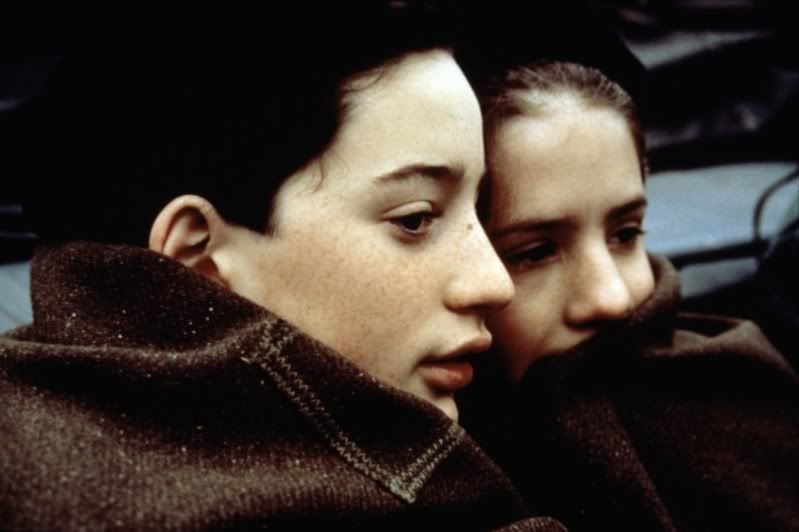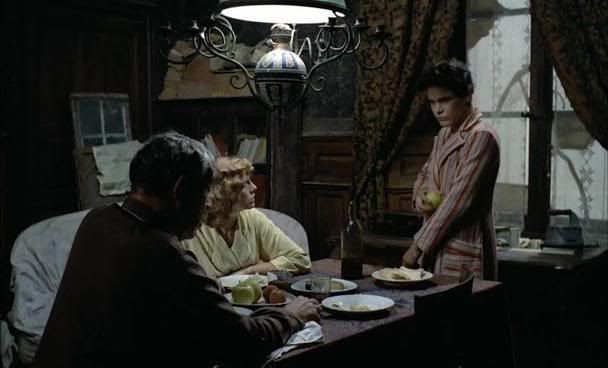Friday, October 14, 2011
 9:51 PM |
Boys During the War
9:51 PM |
Boys During the War

The thing about playing catch-up with old films is that you have more than just a suspicion that everything has always been said about them, and that any utterance from your part is at best an echo with a more contemporary ring to it. But still an echo. The weight of an immense tradition of opinion is an immense one.
What else can I say about Louis Malle's
Au Revoir les Enfants [1987] and
Lacombe Lucien [1974] that have not already been said? Critics such as Pauline Kael and Roger Ebert have given us thorough evaluations of these films.
And so I am left only to share my personal experience with them. I only stumbled onto these titles the past few nights, in my aimless excursion through my library of films -- most of which remain unseen, given the demands adult life has on one's hours. I've done Eric Rohmer's
Six Moral Tales earlier in the week, and so I thought it best to follow that up with some of Malle's films. I remember planning to watch
Au Revoir and
Lacombe a few years ago, promising to do so "as soon as time permitted."
Ah, the lies we tell ourselves.
Yesterday, during an unplanned lull, I knew I had no such time to spare at all, and so I promptly pressed the play button of the DVD player. And thank God for such impulsiveness, because these two films absolutely proved devastating for me. At the end of
Au Revoir, I surprised myself by breaking into tears -- something I have not done since ... what? Isao Takahata's
Grave of the Fireflies [1988]? I knew I had to find it within myself the reason why the films touched me so.

Although filmmed more than a decade apart from each other, these two titles seem like twin bills in Malle's filmmography involving childhood and the loss of innocence during the Second World War.
Lacombe, for me, was more a disturbing psychological study of the banality of evil, and the film gave me a rise in the way it was calculated to do -- its subtle scenes involving Lucien's gradual fall to evil and the expressionless banality he seems to project in his comprehension (or miscomprehension?) of the process proved to me more chilling than any horror film. Kael has written once that the film was all about the actor Pierre Blaise's face -- inscrutable, like a blank slate that contains an undefinable malevolence. That the film -- about a young French boy who unwittingly becomes a collaborator in Nazi-occupied France -- also manages to make us see Lucien's humanity is, I think, a triumph in Malle's skills as one of cinema's giants.
But
Au Revoir, also a film about how the war can rob children of their innocence, is something a little different. It is not sentimental or melodramatic. It is just a well-observed tale about two boys who come to a tentative friendship in a boarding school ran by priests, chronicling the heedless joys and tumbles of boyhood, until war's ugly head comes crashing in and it is slowly revealed that one of the two friends have a secret that needed urgent keeping. How wrenching this film is. How gloriously poignant and subtle about its dealings with betrayal, with heroism, with the loss of innocence and the beginnings of immortal sadness. But I think I teared up because the film dared to present to us that betrayal often comes easy for all of us, even with the best of people, given a context that systematically dehumanizes us. There are no saints in this film -- not even the priest whose fiery homily about doing the utmost to save those who are less fortunate ends with a devastating scene where he withholds a boy's communion simply because the boy is not Catholic, even if the act can in fact help preserve him and keep his secret. But the film does not condemn, at least not by much. Anybody who will not come to tears at the end of Au Revoir -- with that final farewell, with that deadpan voice-over narration by Malle himself, and with that long, steady shot of Julien's face as the last of his innocence comes crumbling down -- has to go ahead and grow a heart.
Ebert once wrote that at the end of one screening of the film, Malle broke down and said to him, "This film is my story. Now it is told at last." And you can indeed feel the personal heartstrings in this wonderful film, so intense it is it can hold you breathless and bothered.
Labels: film
[0] This is Where You Bite the Sandwich
GO TO OLDER POSTS
GO TO NEWER POSTS

















 9:51 PM |
Boys During the War
9:51 PM |
Boys During the War

